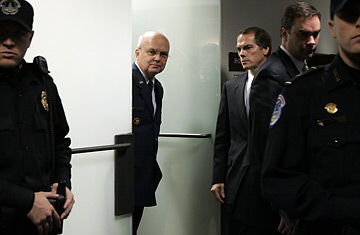
Central Intelligence Agency Director Gen. Michael Hayden, center, peers out of a doorway following a closed-door briefing before the Senate Intelligence Committee on the destroyed CIA interrogation tapes, Tuesday, December 11, 2007.
Taking a public stand against torture confers little political advantage for members of Congress — and it carries the risk of being branded as soft on terrorism. That's why the outrage expressed on Capitol Hill over the admission that the CIA destroyed videos of the interrogation of two al-Qaeda suspects appears to be carefully calibrated. Most of those speaking out are more concerned with questions of accountability and possible obliteration of evidence than they are with what those tapes might have shown about the treatment of detainees. Even before CIA director Michael Hayden offered his account of the tapes' destruction in closed testimony on Capitol Hill this week, Senate Majority Leader Harry Reid denounced a potential CIA cover-up, saying loss of the tapes had damaged the "moral authority" of the U.S.
A former CIA interrogator surfaced this week on ABC's World News Tonight to claim that it had taken just 35 seconds of waterboarding, or simulated drowning, to break 9/11 conspirator Abu Zubaydah in 2002, who then supposedly revealed additional al-Qaeda plots and details that helped the U.S. capture other terrorists. Without elaboration, the former interrogator John Kiriakou maintained that the waterboarding had been approved by the White House. The Administration has commented, "It's no secret the President approved a lawful program in order to interrogate hardened terrorists" — leaving unclear whether waterboarding falls within the Bush White House's definition of lawful interrogation. Torture is forbidden under U.S. law, but Attorney General Michael Mukasey has repeatedly refused to say whether waterboarding is torture. But if Kiriakou is correct in his claims, the waterboarding of Abu Zubaydah may have been recorded on the hundreds of hours of videotaped interrogation destroyed by the CIA.
Yet because the technique of waterboarding exists in a legal gray area, many members of Congress may prefer a don't-ask-don't-tell approach. Reports published this week in the Washington Post indicate that at least four members of Congress, including current House Speaker Nancy Pelosi, received detailed briefings on interrogation techniques used in the CIA's secret prisons, and had offered no objection. Pelosi has not denied or otherwise commented on that published claim.
After Hayden's 90 minutes of testimony before the Senate Intelligence Committee, its chairman, West Virginia Democrat Jay Rockefeller, called the session "a useful and not yet complete hearing" and promised further investigation into who approved the destruction of the tapes and why Congress had not been informed. Hayden told the Senators he could not answer all of their questions because the tapes had been recorded, and then destroyed, on the watch of his predecessors at the CIA, but he promised to make further witnesses available to fill in the blanks.
Judging by its track record, the appetite in Congress for a probe into the politically tricky issue of the actual methods used to extract information from terror suspects remains limited. Legislators have hardly rushed to investigate the CIA's secret prison system and the "rendition" of suspects to third countries where they have allegedly been tortured — even though piles of evidence are available. The agency has routinely kept detailed records, logs, transcripts and medical files on its questioning of prisoners. Hotel and phone records as well as copies of passports with photographs of Americans who staffed secret CIA transport flights for alleged terrorists were also recovered in a Spanish police investigation, and examined by other European investigators. The 114-page Spanish police report into secret CIA flights transporting detainees to secret prisons also referenced extensive records of passengers, crews and flight plans, as well as hotel records of those aboard the planes. Similar documentation has emerged in Italy, where the authorities continue to investigate some two dozen CIA operatives who allegedly participated in the kidnapping of a suspected al-Qaeda figure who claims to have been tortured after the CIA handed him over to Egypt for interrogation.
But none of that information, and the questions it might raise about the treatment of detainees during these offshore interrogations, appears to have piqued the interest of Congress. Nor had the revelation, several weeks ago, that the CIA still had two videos and one audio tape of the questioning of unidentified prisoners requested by a federal judge in the case of now convicted al-Qaeda conspirator Zacarias Moussaoui. The agency had earlier claimed those tapes did not exist.
Last summer, it was also reported that a Spokane-based firm of consultant psychologists, Mitchell Jessen and Associates LLC, had been working under contract to the CIA to refine interrogation methods, and that these had included adaptations of techniques practiced in North Korea and the old Soviet Union. Neither the CIA nor the firm has commented on the reports, and no representatives of the company have been asked to testify before Congress thus far.
Clearly, there are rich seams of evidence to mine for any legislators wishing to test the CIA's oft-repeated assertion that it never tortures captives and that all of its secret interrogations and other activities have been conducted in full compliance with the law. But so far, there have been few takers. Absent a political change of heart on Capitol Hill, the congressional inquiry into the destroyed videos may limit itself to matters of bureaucratic accountability.
